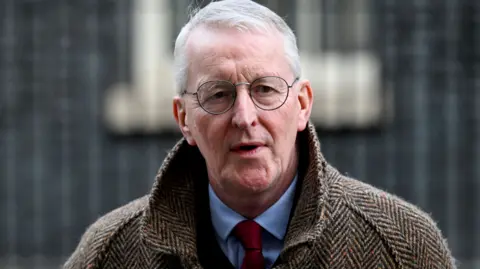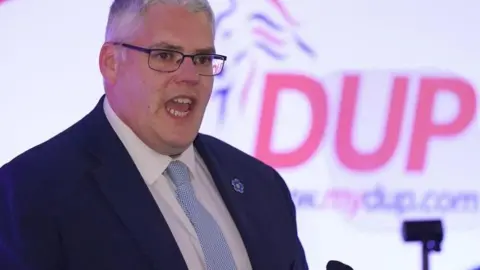ARTICLE AD BOX

 Reuters
Reuters
Northern Ireland Secretary Hilary Benn responded to the Stormont brake request on Monday
The government has rejected a request from Northern Ireland's unionist parties to use the post-Brexit mechanism known as the Stormont brake.
It allows members of the legislative assembly (MLAs) at Stormont to object to changes to European Union rules which apply in Northern Ireland.
All eligible unionist MLAs had backed a Democratic Unionist Party (DUP) motion to pull the brake in a bid to stop changes to EU rules on packaging and labelling of chemicals.
But the UK government, which decides whether the brake is formally triggered, concluded the tests for using it had not been met.
It said the EU rules being challenged do not meet the threshold of having a "significant impact specific to everyday life of communities in Northern Ireland in a way that is liable to persist".
Northern Ireland Secretary Hilary Benn has written to the Speaker of the assembly, Edwin Poots, outlining why the Stormont Brake was not being pulled.
The brake formed part of an overall package of measures - known as the Windsor Framework - agreed by the UK and EU two years ago, aimed at resolving problems with post-Brexit trade arrangements in Northern Ireland.
The framework is the special Brexit deal which applies to Northern Ireland and means it continues to follow some EU laws relating to goods.
The brake was designed to give Stormont's politicians a greater say before any amended EU rules could take effect in Northern Ireland.
Entirely new rules are dealt with under a similar process known as an applicability motion.
The move by unionist parties before Christmas is being viewed as a first test of the mechanism since power-sharing returned at Stormont almost 12 months ago.
There are restrictions on its use for assembly members who wish to use the brake.
Firstly, the measure can only be used in the "most exceptional circumstances and as a matter of last resort".
The mechanism also cannot be used for "trivial" reasons and those seeking it to be pulled must demonstrate that the rule being challenged is having a "significant" impact on everyday life in Northern Ireland.
Unionist parties had a two-month "scrutiny period" from the publication of the EU law to make their request and for the government to respond, making Monday the deadline for a decision by Northern Ireland Secretary Hilary Benn.
What if the Stormont Brake had been pulled?
If the government had determined the conditions were met, it would have formally notified the EU and the changed law would not apply.
There would then have been "intensive consultation" between the UK and EU.
The Joint Committee - the UK-EU body responsible for overseeing the Brexit deal - would be required to discuss the rule in question.
Once those discussions concluded, the UK government could either send it back to the assembly for a cross-community vote or decide the rule should not apply in Northern Ireland.
At that stage, the government could still avoid a Stormont vote if it assessed there were "exceptional circumstances" including an assessment that the rule would not create a new regulatory border between Great Britain and Northern Ireland.
If the UK decided not to adopt the rule, the EU could take "appropriate remedial measures", which could include measures to address the fact that NI goods may no long fully comply with EU law.
What had parties said?
When his party tabled the motion in December in a bid to see the brake pulled, DUP leader Gavin Robinson said the new EU regulation would have a "significant and prolonged" impact in Northern Ireland if it took effect.
He said it would introduce a host of new requirements for labels attached to chemical products, including new minimum font sizes and rules around spacing, making current labels unusable for the majority of products.
"Critically, these changes would not be required for products on the market in Great Britain," he added.

 PA Media
PA Media
DUP leader Gavin Robinson's party tabled a motion to have the brake pulled
First Minister Michelle O'Neill, of Sinn Féin, said other parties had not been informed of the DUP's actions and warned it could potentially cause instability for businesses in Northern Ireland.
The leader of the official opposition at Stormont, Matthew O'Toole, described the use of the brake as "a stunt".
"We warned that the so-called Stormont brake would be used for crude partisan purposes and so it has proven," the Social Democratic and Labour Party assembly member said.
Traditional Unionist Voice leader Jim Allister said the decision was "not just a calculated slap in the face of all democrats but creates a moment of truth for the DUP".
"The secretary of state has thrown down the gauntlet to the DUP," he said.
"They need to pick it up and demonstrate, while they still can, that unionism will not be humiliated in this way.
"It's time to call time on the executive and the DUP's implementation of EU rule."

 6 hours ago
1
6 hours ago
1








 English (US) ·
English (US) ·